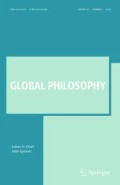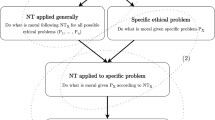Abstract
The roles of abductive inference in dynamic heuristics allows scientific methodologies to test novel explanations for the world’s ways. Deliberate reasoning often follows abductive patterns, as well as patterns dominated by deduction and induction, but complex mixtures of these three modes of inference are crucial for scientific explanation. All possible mixed inferences are formulated and categorized using a novel typology and nomenclature. Twenty five possible combinations among abduction, induction, and deduction are assembled and analyzed in order of complexity. There are five primary categories for sorting these inferential procedures: fallacies, non-scientific procedures, quasi-scientific procedures, scientific procedures, and scientific heuristics.
Similar content being viewed by others
Notes
Ordinary abduction is evidently habitual in practice for humans, and habits can be brought under reflective review for deliberation, especially if they are acquired in learning (Magnani 2010). No “instinct or inference” dichotomy about abduction is forced upon us, as if learning must be rigid and automatic. It is a debatable question whether something akin to abduction is instinctive for non-human animals (Park 2012).
Musgrave (2012, p. 127).
Stanford (2011) makes a similar point regarding the supposed self-sufficiency of Bayesian confirmation.
Peirce (1934, para. 171–172).
Campos (2011) distinguishes Peirce’s abduction apart from inference to the best explanation. For broader explorations of abduction’s role in procedures of explanatory reasoning, consult Flach and Kakas (2000), Lipton (2004), Paavola (2005), Aliseda (2006), Pizzi (2007), Schurz (2008), Gauderis and Van De Putte (2012), Gauderis (2013), Aliseda and Beirlaen (2014), and Velázquez-Quesada (2015).
See Psillos (2009, 135).
Consult Brigandt (2010).
See Shackelford (2003, chap. 2).
On pseudo-science in general, the reader may begin by consulting Pigliucci and Boudry (2013).
Heidarzadeh (2008, chap. 4).
Consult Richardson and Stevens (2015).
References
Aliseda A (2006) Abductive reasoning: logical investigations into discovery and explanation. Springer, Dordrecht
Aliseda A, Beirlaen M (2014) A conditional logic for abduction. Synthese 191:3733–3758
Brigandt I (2010) Scientific reasoning is material inference: combining confirmation, discovery, and explanation. Int Stud Philos Sci 24:31–43
Buxton R (ed) (1999) From myth to reason? Studies in the development of Greek thought. Oxford University Press, Oxford
Campos D (2011) On the distinction between Peirce’s abduction and Lipton’s inference to the best explanation. Synthese 180:419–442
Flach P, Kakas A (eds) (2000) Abduction and induction: essays on their relation and integration. Kluwer, Dordrecht
Gauderis T (2013) Modelling abduction in science by means of a modal adaptive logic. Found Sci 18:611–624
Gauderis T, Van De Putte F (2012) Abduction of generalizations. Theoria 75:345–363
Heidarzadeh Tofigh (2008) A history of physical theories of comets, from Aristotle to whipple. Springer, Berlin
Lévi-Strauss C (1995) Myth and meaning: cracking the code of culture. Schocken Books, New York
Lipton P (2004) Inference to the best explanation, 2nd edn. Routledge, London
Magnani L (2010) Abductive cognition: the epistemological and eco-cognitive dimensions of hypothetical reasoning. Springer, Dordrecht
McMullin E (1992) The inference that makes science. Marquette University Press, Milwaukee
Mikalson J (2010) Greek popular religion in greek philosophy. Oxford University Press, Oxford
Morgan K (2000) Myth and philosophy from the presocratics to Plato. Cambridge University Press, Cambridge
Musgrave A (2012) Deductivism surpassed: or, foxing in its margins? J Gen Philos Sci 43:125–132
Niiniluoto I (2004) Truth-seeking by abduction. In: Stadler F (ed) Induction and deduction in the sciences. Kluwer, Dordrecht, pp 57–82
Paavola S (2005) Abduction as a logic of discovery: the importance of strategies. Found Sci 9:267–283
Park W (2012) Abduction and estimation in animals. Found Sci 17:321–337
Peirce CS (1934) The collected papers of Charles Sanders Peirce, volume 5. In: Hartshorne C, Weiss P (eds) Harvard University Press, Cambridge
Pietarinen A, Bellucci F (2014) New light on Peirce’s conceptions of retroduction, deduction, and scientific reasoning. Int Stud Philos Sci 28:353–373
Pigliucci M, Boudry M (eds) (2013) Philosophy of pseudoscience: reconsidering the demarcation problem. University of Chicago Press, Chicago
Pizzi C (2007) Abductive inference and iterated conditionals. In: Magnani L, Ping L (eds) Model-based reasoning in science, technology and medicine. Springer, Dordrecht, pp 365–381
Psillos S (2009) An explorer upon untrodden ground: Pierce on abduction. In: Woods J, Gabbay D, Hartmam S (eds) Handbook of the history of logic, vol. 10: inductive logic. Elsevier, Amsterdam, pp 117–151
Richardson S, Stevens H (eds) (2015) Perspectives on biology after the genome. Duke University Press, Durham
Schurz G (2008) Patterns of abduction. Synthese 164:201–234
Shackelford J (2003) William Harvey and the mechanics of the heart. Oxford University Press, Oxford
Stanford PK (2011) Damn the consequences: projective evidence and the heterogeneity of scientific confirmation. Philos Sci 78:887–899
Velázquez-Quesada FR (2015) Reasoning processes as epistemic dynamics. Axiomathes 25:41–60
Wians W (ed) (2009) Logos and Muthos: philosophical essays in Greek literature. State University of New York Press, Albany
Author information
Authors and Affiliations
Corresponding author
Rights and permissions
About this article
Cite this article
Shook, J.R. Abduction, Complex Inferences, and Emergent Heuristics of Scientific Inquiry. Axiomathes 26, 157–186 (2016). https://doi.org/10.1007/s10516-015-9282-y
Received:
Accepted:
Published:
Issue Date:
DOI: https://doi.org/10.1007/s10516-015-9282-y




